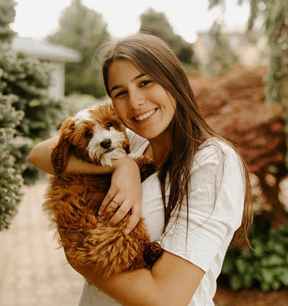
Jenna Rudolfsky and Gryffin 288

Photo by Rachel Leiner
Jenna Rudolfsky, a veterinary student and loving owner of a cockapoo, Gryffin, has deep compassion for people grieving the death of a pet. Rudolfsky helps to manage and staff a pet loss hotline operated by the Cornell University College of Veterinary Medicine.
"He was just a dog."
"It's not like your kid died or anything."
"It's been a few weeks. Shouldn't you be feeling better by now?"
By the time owners call the Cornell Pet Loss Support Hotline, they've heard it all before. Well-meaning families, friends and co-workers can sometimes do more harm than good. Owners are looking for someone to take their grief seriously. Some need validation, and many need advice. Almost everyone needs someone to listen to their story.
While enrolled in the elective course VTMED 6736: Pet Loss and Bereavement Counseling, Cornell University veterinary students staff the phone during shifts for the Pet Loss Support Hotline, speaking to people from all walks of life about the animals they lost. This free service provides callers with support to help them process the passing of their beloved companions with compassion and understanding from specially educated volunteers. Students have attended training sessions, rounds and lectures to help them prepare for the interactions. While the hotline is not a mental health service, the comfort and coping skills its staff imparts are always met with appreciation.
I completed the course this year during the spring semester. Afterward, I volunteered to stay with the hotline as an officer, a position that involves setting the hours of operation and developing guidelines for future training opportunities for new volunteers. These managerial functions are important but taking calls and sharing in people's stories are what fulfill me most.
Although I am the one providing the support, I believe I benefit from the conversations as much as the callers. I have spoken to young dog owners, retirees, couples, people who have owned numerous animals, and people who are mourning the loss of their first-ever pet. Whether they have lost a dog, a cat, a horse or a bird, the fond memories I hear make me more grateful that I am studying veterinary medicine. The joy these countless animals have brought their families drives my passion for their care further still. As I listen to mourning callers recount the times their dogs made them laugh or when their cats cuddled up to them, I share their happiness in these wonderful memories. Sometimes, the story can be hard to hear, like when a caller recounts a beloved animal's painful illness or death, but regardless, I am reminded of the strength of the human-animal bond I am trying to preserve.
I also am reminded during these calls of the need for human connection. During the onset of the COVID-19 pandemic, the hotline was suspended for three months. This was devastating to me. In these times when we are isolated in our homes, grief can feel even more overwhelming. Understanding that people might be having to cope without the ability to lean on others, the hotline felt more important than ever.
Prior to the pandemic, students would answer calls in our on-campus office. Once campus buildings closed and social distancing was required, the other officers and I managed to develop and implement a remote calling system in order to continue serving pet owners throughout the country. From the increased number of hits on our Facebook page since the pandemic took hold, we could tell people were really seeking us out during this time.
In the weeks since we began taking calls again, I have laughed and I have cried. I have talked about ways to memorialize a pet, from making memory boxes to keeping a journal to record stories that may otherwise fade over time. I have discussed with callers a variety of broader philosophical topics, too, such as my religious beliefs or how the COVID-19 pandemic has changed my perspective on life. While these personal topics are raised by the callers, I am always willing to share my views if it helps them grieve.
Every call ends with a "thank you." People tell me the relief they feel talking to someone who understands, without interruption and for as long as they need. People ask me to call them again to follow up, which I am glad to do. While I am grateful for their appreciation, what I don't tell them — because the conversation is not about me — is that I am thankful they were willing to share their stories and their grief with a stranger over the phone. I think of how brave they were to ask for help. I hope that all those in the veterinary profession can promote resources such as ours in order to assist people as they move along in their journey from grief to healing.
This summer, our hotline is open in the evenings on Tuesdays, Thursdays and Saturdays. We can be reached at 607-218-7457 from 6:15 p.m. to 9:15 p.m. EDT while we work remotely. A few other veterinary schools and independent organizations also operate hotlines, although their routine might be interrupted by the pandemic like ours was. Where possible, it may be more convenient to consult with a group that operates in the same time zone as your location.
If there are any prospective callers curious as to what happens when they pick up the phone, I can tell you that you will lead the conversation. Cornell DVM students are trained in active listening and empathy skills. They let you talk when you need to. If you want to cry on the call, they will stay on the line while you do. Whether your pet died yesterday or six months ago, we want to hear your story.
About the author: Jenna Rudolfsky is a graduate of Cornell University with a bachelor's degree in animal science. She is about to begin her second year at Cornell's College of Veterinary Medicine in Ithaca, New York. This summer, she is working as a "VINtern" in the Veterinary Information Network's continuing education and rounds departments. Jenna is a proud dog mom to her 1-year-old cockapoo, Gryffin.